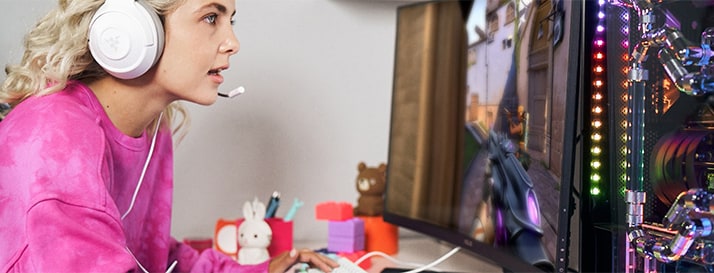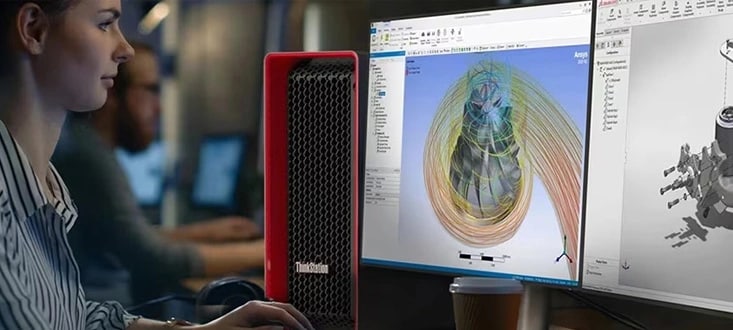13th Generation Intel Core desktop processors
Powerful 13th Generation Intel® Core™ processors for desktop PCs were announced in late 2022. The news set of a wave of positive reviews, with manufacturers such as Lenovo expected to release numerous 13th gen-powered systems in the ensuing months.
NOTE: These 13th Gen Intel® Core™ desktop processors were preceded by other models, including 12th Gen Intel® Core™ desktop processors.
Boasting faster unlocked clock speeds and higher maximum core and thread counts, 13th generation Intel Core chips for desktops (and towers) mark a big advance over earlier generations.
How big an advance? Intel says testing shows its unlocked 13th Gen Core desktop processors deliver "the best gaming, streaming and recording experience"1 you can get.
Want raw speed? The company calls its Intel® Core™ i9-13900K chip "the world’s fastest desktop processor"2—period.
Intel has promised to release, over time, 22 different 13th Gen Intel Core desktop processors—built to support business, content creation, gaming, and more. Of course, not every manufacturer will build PCs using every 13th Gen chip. Search our full line of desktop PCs to find Lenovo's initial 13th Gen Intel Core-powered offerings when they become available.
And mobile users, take heart. They're not here yet, but Intel has announced 13th generation Intel Core mobile processors, too. They'll feature many of the same technical advances, and when Lenovo releases our first 13th gen-powered mobile systems, you'll find them in our laptop line-up.
Faster 'Performance' cores, additional 'Efficient' cores
13th Gen Intel® Core™ processors extend Intel's recent move to improve computing through the use of distinct Performance cores (also called P-cores) and Efficient cores (E-cores) on the same processor chip. It's a hybrid architecture that helps you get more from your PC by intelligently distributing workloads to the parts of the processor than can handle them best.
Are you heavy PC user, such as a content creator or a gamer? The latest Intel chips send your most demanding tasks—or workloads, like video games, that are best performed on single cores—to the P-cores, which are physically larger and run at higher clock speeds. Meanwhile, background operations and other simple tasks (including those easily shared across multiple cores) go to the smaller E-cores, which consume far less energy.
Intel's 13th Gen Core processors boast the fastest P-cores they've ever released and up to twice as many E-cores as some earlier models. So you get up to 15% better single-threaded performance and up to 41% better multi-threaded performance.3
With your work distributed to the P-cores and E-cores, you can feel the power, no matter how you use your desktop or tower PC:
- World’s best gaming experience:1 Top-end 13th Gen Intel Core CPUs have up to 24 cores (8 P-cores, 16 E-cores) and 32 threads. And with clock speeds up to 5.8 GHz, they can push high frame rates—delivering unleashed gaming experiences across top titles.4
- Improved content creation: 13th Gen Intel Core desktop processors add more E-cores than earlier models. This enhances multi-threaded performance and, as Intel says, keeps you in the creative flow as you send one compute-intensive workload after another to your CPU.
- Unmatched overclocking—for everyone: Beginners and experts enjoy an unmatched overclocking experience,5 with higher average overclock speeds across the P-cores, E-cores, and DDR5 memory. There's easy one-click overclocking and pre-set overclock modules, too.
And remember, with Intel's new P-core/E-core processor architecture, the processor itself manages where to send each workload. You don't have to think about it. Just enjoy the blazing speed.
13th Gen Intel Core processors: Features for desktops
Desktop PCs and towers are used for virtually every computing task—work and business, content creation, schoolwork, gaming and more. And 13th Gen Intel® Core® processors deliver leading edge desktop performance, with several new or improved features:
- When you've got the power and thermal headroom, Intel® Adaptive Boost Technology and Thermal Velocity Boost can increase clock frequencies on unlocked Intel Core i9 chips.
- Enjoy a big leap in multi-threaded performance with the addition of more E-cores on Core i5, i7, and i9 models. Forget multi-tasking. You'll be mega-tasking!
- For faster communication within your PC (tasks and commands, graphics, file transfers, etc.) there's now support for PCIe Gen 5.0, with as many as 16 lanes off the processor.
- Another improvement: upgraded memory support, compatible with both DDR5-5600 and DDR5-5200 memory (with continued DDR4 compatibility).
- Compared to earlier-generation Core CPUs, there's up to twice the L2 cache as well as increased L3 cache, too.
In conjunction with the release of its 13th Gen Core processors, Intel also announced a new Intel® 700 Series chipset with improved performance and reliability features. Compared to some earlier Intel chipsets, it offers up to eight additional PCIe Gen 4 lanes which, combined with PCIe Gen 3.0 lanes, adds up to up to 28 total lanes off the chipset.
13th Gen Intel Core desktop processors: Specifications
Table 1 provides a high-level look at the specifications Intel promised when it launched its new 13th generation Intel® Core™ desktop processors. Remember that not all manufacturers build systems with every available Core processor, so be sure to review the specs of any specific systems you're considering, which may differ from what's shown here.
Table 1: Announced specifications of 13th Generation Intel® Core™ desktop processors
| 13th Generation Intel® Core™ i9 (Desktop) | 13th Generation Intel® Core™ i7 (Desktop) | 13th Generation Intel® Core™ i5 (Desktop) | |
|---|---|---|---|
Turbo Frequency | Up to | Up to | Up to |
Intel® Turbo Boost Max 3.0 Frequency | Up to | Up to | Not available |
Performance-Core Max Turbo Frequency | Up to | Up to | Up to |
Performance-Core Base Frequency | 3.0 GHz | 3.4 GHz | 3.5 GHz |
Efficient-Core Max Turbo Frequency | Up to | Up to | Up to |
Efficient-Core Base Frequency | 2.2 GHz | 2.5 GHz | 2.6 GHz |
Processor Cores (P-cores + E-cores) | 24 (8P+16E) | 16 (8P+8E) | 14 (6P+8E) |
Processor Threads | 32 | 24 | 20 |
Intel® Hyper- | Yes | Yes | Yes |
Intel® Thread Director | Up to | Up to | Up to |
Intel® Thread Director | Yes | ||
Intel® Smart Cache | 36 MB | 30 MB | 24 MB |
Total L2 Cache | 32 MB | 24 MB | 20 MB |
Max Memory Speed | Up to DDR5-5600 | ||
Memory Channels | 2 | ||
CPU PCIe 5.0 Lanes | Up to 16 | ||
CPU PCIe 4.0 Lanes | 4 | ||
You see? From faster P-cores to support for the latest memory modules, 13th generation Intel Core desktop processors beat the company's earlier CPUs in ways big and small. If you're in the market for a new PC, check out Lenovo's full line of powerful desktops and towers—including new models with 13th Gen Intel Core CPUs when they're available.
Intel, the Intel logo, Intel Evo, Intel Core, and Intel vPro are trademarks of Intel Corporation or its subsidiaries.
1 World’s Best Gaming Experience based on performance and unique features of 13th Gen Intel Core processors, including in comparison to 12th Gen Intel Core i9-12900K, AMD Ryzen 9 5950X, and AMD Ryzen 7 5800X3D, as of Sept. 7, 2022. See www.intel.com/PerformanceIndex for details.
2 Based on the Intel Core i9-13900K is the world’s fastest desktop processor at 5.8 GHz. As of September 7, 2022.
3 Performance varies by use, configuration, and other factors. Learn more at www.Intel.com/PerformanceIndex. Performance results are based on testing as of dates shown in configurations and may not reflect all publicly available updates. See configuration disclosure for additional details.
4 Performance hybrid architecture combines two core microarchitectures, Performance-cores (P-cores) and Efficient-cores (E-cores), on a single processor die first introduced on 12th Gen Intel Core processors. Select 13th Gen Intel Core processors do not have performance hybrid architecture, only P-cores, and have same cache size as prior generation; see ark.intel.com for SKU details.
5 Overclocking may void warranty or affect system health. Results may vary. See www.intel.com/overclocking for details.



